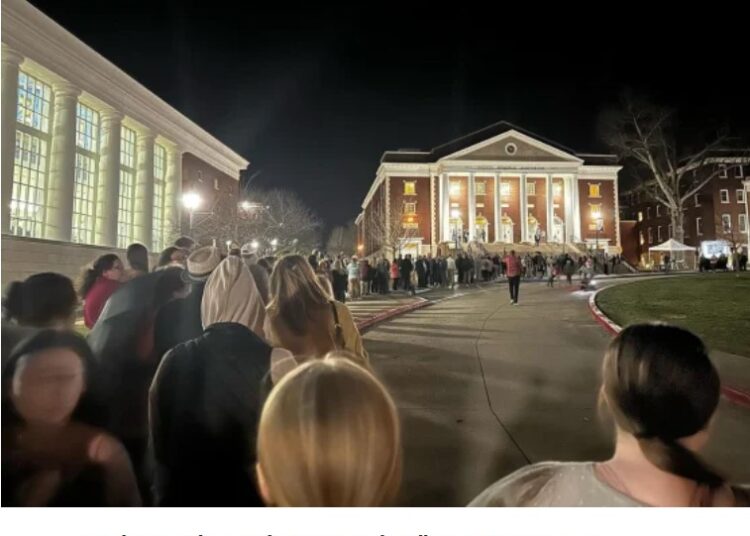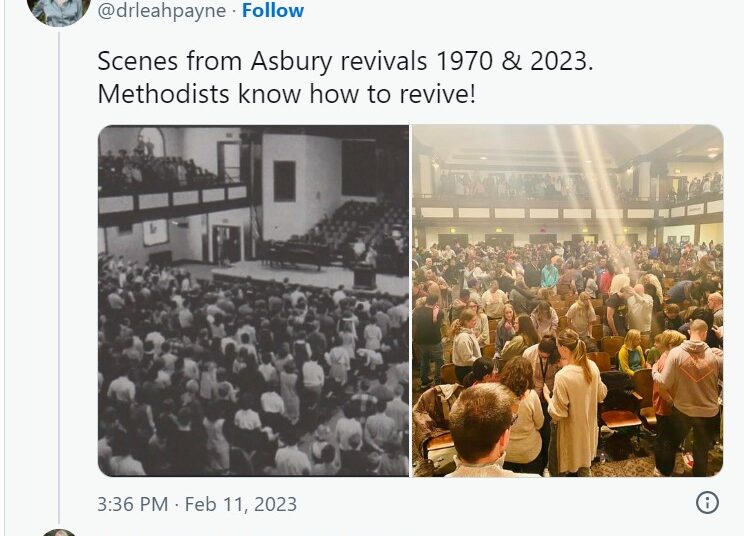It started as a routine Christian service at a college chapel in Kentucky with half a dozen people in attendance. It has now ballooned into a nonstop prayer and worship session that some are calling a “revival” — and people are traveling thousands of miles to take part in it after seeing viral videos on TikTok.
Asbury University is a small Christian college in Wilmore, Kentucky. At the tail-end of the service, a couple dozen lingering students assembled informally in a gathering that’s been going now for seven days straight, 24 hours a day.
“The first day we had a very ordinary service, I would call it unremarkable,” said university President Dr. Kevin Brown. Following a morning service on Feb. 8, a multicultural gospel choir sang on stage. Some students stuck around afterward, and by evening more and more had trickled into the sanctuary creating something special, said Brown.
“It has absolutely been social media that is the mechanism that people found out about this,” said Mark Whitworth, Asbury University’s vice president of communications.
There is nothing fancy or sophisticated here: no stage, no technological enhancements, it’s a simple service. Just wooden sanctuary chairs filled with people who very obviously are finding that human warmth is a balm for the anxiety that we feel today in the wake of violence and tragedy: unending shootings that target even children, earthquakes that devastate entire populations, hatred that poisons our country. It’s no wonder that the event has gone viral on social media.
On TikTok and Instagram, videos hashtagged “Asbury Revival” are racking up millions of views.
“Students are hungry for Jesus,” Nick Hall writes on Instagram.nickhallpulse / Instagram, An Asbury Professor says: “we’re witnessing a surprising work of God.”
The phrase “spiritual revival” can carry different meanings; in Christianity, they generally refer to a resurgence in interest in the church from believers and nonbelievers. Many attendees of the Asbury gathering say they were drawn by a spiritual presence they felt was at the event.
In the TikTok videos of the event, some people are seen crying to worship music, with hands extended high, while others group up and place hands on those seeking prayer. The response of many TikTokers has gone beyond the typical “like” or comment on the videos, which in some cases have stirred viewers to make the trek to Asbury for themselves.
Much like the fervor that has created sanctuaries like Fátima in Portugal, and Lourdes in France, the Asbury Revival is being fueled by the spiritual energy of those praying and is gathering momentum.
Tuesday night capped the largest crowd yet: 3,000 worshipers piled into the college chapel and four overflowed facilities throughout the college town. At least two-thirds of the attendants are from out of state, according to Brown.
Students and staff from 22 schools have visited so far, alongside groups from Hawaii to Massachusetts, university faculty said. Travelers from Singapore and Canada are expected to arrive soon, they added.
Although social media has served as a lightning rod for the event, Asbury faculty said they were cautious not to market or brand what was happening.
“The university made an intentional decision not to publicize this because we wanted to place an abundance of respect towards the experience of our students,” said Brown.
And according to Hall, leading the charge in the sanctuary and on social media is the Gen Z generation.
This is not the first time that such a prayer revival happens at Asbury University as 50 years ago a similar prayer and worship event took place across the campus. Never, though, had a gathering of this sort lasted as long as this one, which also benefits from the colossal propagating force of social media.
As attendance swiftly rises, some students who joined the spiritual movement at Asbury over the past week have returned to their own schools, where separate worship and prayer gatherings have broken out. Students at Lee University in Tennessee started a nonstop prayer vigil Monday morning that is still ongoing, said Brian Conn, director of communications at Lee University. Other schools with similar reports include Anderson University in Indiana, Ohio Christian University near Columbus, and a handful of others.











